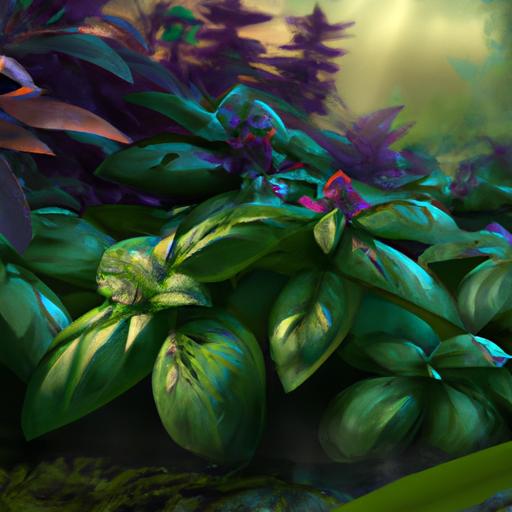Are you trying to grow basil, but your seeds aren’t germinating? Growing your own basil can give you access to fresh herbs year round, while also providing many health benefits.
In this article, we’ll explore the common causes of failed germination, including poor soil quality, too much or too little moisture, and temperatures that are too cold or too hot.
We’ll also discuss the importance of using fresh, high-quality seeds and how to ensure the proper conditions for germination.
Whether you’re a beginning gardener or a seasoned pro, read on to learn why your basil might not be germinating and what you can do to fix the issue.
Table of Contents
Short Answer
There are a few reasons why your basil may not be germinating.
It could be due to the seeds being too old, the soil not having the right nutrients, or the temperature not being warm enough.
Make sure you are using fresh seeds, using a nutrient-rich soil, and keeping the temperature between 70-85 degrees Fahrenheit.
If you still have trouble, try soaking the seeds overnight before planting and using a heating mat to keep the soil warm.
The Benefits of Growing Basil
Growing basil has many benefits, both in the garden and in the kitchen.
Its an easy-to-grow plant, and its flavor adds a unique depth to a variety of dishes.
From pesto to salads, caprese sandwiches to tomato sauces, basil adds a delicious burst of flavor to any dish.
Basil also has many medicinal properties, and its aromatic qualities make it a great choice for aromatherapy.
In the garden, basil is a great companion plant.
It helps repel some pests, like aphids and flies.
It is also said to help improve the flavor of tomatoes and peppers when planted near them.
Basil also attracts pollinators, so it can be beneficial for other plants in the garden, too.
Basil is a great plant for beginner gardeners, as it is easy to grow and even easier to enjoy.
If youre experiencing difficulties getting your basil to germinate, dont give up! Following the tips in this blog post can help ensure that your basil has the best chance of being successful.
With the right conditions, you can enjoy all the benefits of growing basil in your garden.
Common Causes of Failed Germination

When it comes to gardening, seeing those first little sprouts emerge from the soil is one of the most exciting parts of the process.
This is especially true when it comes to growing basil, an herb that has been used in cooking for centuries.
Unfortunately, there are many common causes of failed basil germination, including poor soil quality, too much or too little moisture, and temperatures that are either too cold or too hot.
Additionally, old or expired seeds may have lost their viability and will not germinate.
To ensure successful germination of basil seeds, it is important to prepare the soil for planting.
The soil should be well-draining and moist, as too much or too little moisture can cause the seeds to rot or dry out.
Additionally, the optimal temperature for basil germination is between 20 and 30 degrees Celsius.
If the temperature is too cold or too hot, the seeds may not germinate.
When purchasing basil seeds, it is also important to ensure that the seeds are fresh and viable.
Old or expired seeds may not germinate, so it is best to purchase new seeds each season.
With the proper conditions, basil should germinate in 1-2 weeks.
It is also important to remember to water the seeds regularly and provide them with adequate sunlight to ensure successful growth.
Poor Soil Quality
Poor soil quality is one of the most common reasons why your basil may not be germinating.
If the soil is too dense or lacks the right nutrients, your basil seeds may not be able to grow.
To ensure your soil is of the best quality for germination, you should check the pH level of the soil.
Ideally, the soil should be slightly acidic, around a pH level of 6.5.
Additionally, the soil should be well-draining and have enough organic matter to provide nutrients to the growing plant.
If the soil is too dense, you can add more organic matter, such as compost, to help loosen it up.
If the soil is too acidic, you can add a soil amendment like lime to raise the pH level.
With the right soil conditions, your basil should have the best chance of germinating.
Too Much or Too Little Moisture

Moisture is a critical factor for the germination of basil seeds.
Too much or too little moisture can prevent seeds from germinating.
If the soil is too wet, the basil seeds can become waterlogged and not receive enough oxygen to trigger the germination process.
On the other hand, if the soil is too dry, the seeds will dry out and not be able to absorb the water they need to germinate.
To ensure the right amount of moisture, make sure to evenly water the soil around the basil seeds.
Its best to avoid overwatering as this can lead to root rot and other issues.
The soil should be damp but not saturated.
Check the soil moisture level by sticking your finger an inch into the soil.
If it feels dry, its time to water.
Additionally, you should cover the soil with a thin layer of mulch to help retain moisture.
This also helps to keep the soil temperature even, which is important for germination.
If youre still having difficulty getting your basil to germinate, try using a seed starting mat that can provide the right amount of heat and moisture for germination.
Temperatures That Are Too Cold or Too Hot
When it comes to germinating basil seeds, temperature plays a key role.
If the soil is too cold, the seeds may not be able to sprout.
On the other hand, if the soil is too hot, the seeds may become scorched and unable to germinate.
The ideal temperature range for basil seed germination is between 20 and 30 degrees Celsius (68-86 degrees Fahrenheit).
If temperatures are outside of this range, you may be out of luck.
You can easily check the temperature of your soil with a soil thermometer.
If you don’t have one, you can purchase one at your local gardening store or online.
Once you have the temperature, you can adjust it as needed.
If the temperature is too cold, you can use a seedling heat mat to help warm up the soil.
If the temperature is too hot, you can either move your seeds to a cooler spot or use a fan to cool down the soil.
Once you’ve set the temperature to the right range, you’ll need to make sure it stays consistent.
Fluctuations in temperature can cause the seeds to go dormant, resulting in delayed germination or no germination at all.
If you live in an area with extreme temperature variations, you may need to invest in a thermostatically controlled heating system to ensure the temperature remains consistent.
By monitoring and controlling the temperature of your soil, you’ll be able to ensure that your basil seeds germinate properly.
While basil seeds may be finicky, they are not impossible to germinate.
With the right temperature range, you should be able to see your seeds sprout in 1-2 weeks.
Old or Expired Seeds

When it comes to growing basil, old or expired seeds can be a major obstacle to successful germination.
Seeds that have been stored for an extended period of time can be prone to losing their viability, which means they likely wont germinate.
To ensure your basil seeds are fresh and viable, its best to purchase seeds that are less than a year old.
If youre looking to save money, you can buy in bulk and store the remaining seeds in an airtight container in a cool, dry place.
The seeds should be checked regularly to ensure they are still viable.
If youre unsure whether or not your seeds are still viable, you can conduct a germination test.
Simply place a few seeds between two damp paper towels and keep them in a warm location.
If the seeds dont germinate within a few days, theyre likely old or expired.
Ensure the Proper Conditions for Germination
For gardeners hoping to grow basil from seed, it is essential to ensure that the ideal conditions are present to make germination possible.
Poor soil quality, too much or too little moisture, and temperatures that are too cold or too hot can all prevent seeds from germinating.
Additionally, old or expired seeds may have lost their viability.
To increase the chances of successful germination, gardeners should make sure the soil is of a high quality that is well-draining and moist.
The ideal temperature for basil germination is between 20 and 30 degrees Celsius, so it is important to find a spot in the garden that is consistently within this range.
Furthermore, make sure that the seeds are fresh and viable.
Basil seeds can be stored for several years, but they will eventually lose their viability and will not germinate.
With these conditions in place, gardeners should expect to see germination within 1-2 weeks.
If the seedlings do not appear after this time, it may be necessary to start again or investigate further potential causes for the lack of germination.
Final Thoughts
Growing basil in your garden has numerous benefits, from adding flavor to your dishes to providing a natural insect repellent.
However, if your basil seedlings aren’t germinating, it could be due to poor soil quality, too much or too little moisture, or temperatures that are too cold or too hot.
Additionally, old or expired seeds may have lost their viability.
To ensure successful germination of your basil, make sure the soil is well-draining and moist, the temperature is between 20 and 30 degrees Celsius, and the seeds are fresh and viable.
With the proper conditions, your basil should germinate in 1-2 weeks.
Try these tips today and start reaping the rewards of a thriving herb garden!

